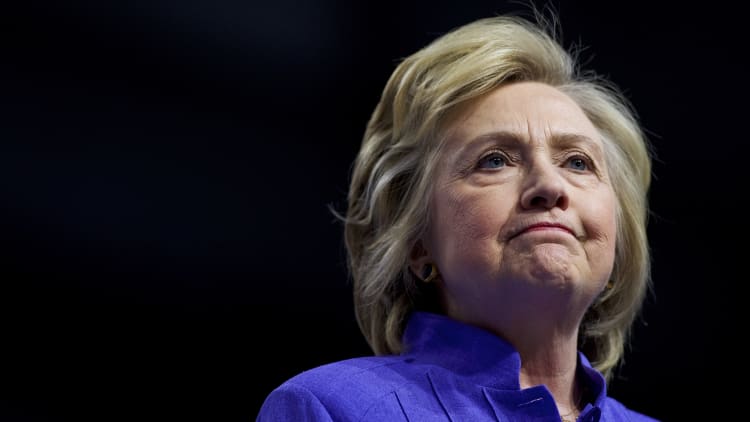
While the presidential campaign has given new meaning to the concept of unpredictability and instability, one thing it won't shake is the U.S. credit standing, according to one major ratings service.
In a report issued Wednesday, Moody's Investors Service said the nation will maintain its pristine rating no matter who wins the hotly contested race.
"The election outcome will not affect the U.S.'s Aaa stable rating," analyst Sarah Carlson and others wrote. "The U.S. possesses substantial credit strengths, including a very large, flexible economy, and the status of the dollar and Treasury bond as global reserve currency and bond market benchmark."
The U.S. has found out the hard way how political instability can affect creditworthiness.
Back in August 2011, Moody's rival Standard & Poor's shocked financial markets when it cut the U.S. rating from triple-A to AA+ in the wake of a budget deal that the agency said came up short in addressing debt and deficit issues. The move briefly shook up markets, with the initially plunging more than 6 percent on the news.
Moody's did not cut its rating at the time, but later switched its outlook for the U.S. to "negative."
The debt and deficit picture hasn't gotten much better since the downgrade, but low interest rates have helped the government manage both.
The national debt at the time of the downgrade was $14.6 trillion, $9.9 trillion of which was held by the public. The total figure today is $19.5 trillion, $14.1 trillion of which is held by the public, according to the Treasury Department. The budget deficit in 2011 was $1.3 trillion; the estimate for 2016 is $615 billion.
While saying that it would take no action based on the election's outcome, the agency did not offer the U.S. a free ride. It expressed concern about some of the proposals being bandied around during election season and said they could have consequences, with focus particularly on infrastructure spending and tax cuts that aren't paid for.
"The next administration's fiscal policies will shape the U.S.'s credit profile more than has been the case for recent administrations," the report said. "Neither candidate has detailed how they would tackle fiscal challenges stemming from entitlement spending, although their proposals continue to take shape. Without countermeasures, these costs will weaken the U.S.'s credit profile over the coming years."
Examining the competing proposals between major party candidates, Moody's said Hillary Clinton's plans generally entail more direct revenue through tax increases while Donald Trump's plans call for tax cuts and spending with the belief that economic growth will pay for both.
The agency pointed out that the U.S. has lagged the world over the past decade in infrastructure spending. An increase would work for the U.S. as long as it is funded.
Moody's emphasized that the choices the next president makes will be critical.
"The U.S. is currently the most indebted Aaa-rated sovereign in our rated universe in terms of debt to GDP, followed by Canada as a distant second," the report said. "And the coming years hold the prospect of further rises in debt levels which will, if unchecked, place downward pressure on the U.S.'s credit profile. Policy choices will determine whether that pressure rises, or dissipates."
Moody's Analytics, which operates independently of Moody's ratings service, released an oft-cited analysis earlier in the summer saying that Trump's proposals would cause a "lengthy recession," while Clinton's would be better for growth. However, the ratings agency did not address the quality of the plans.
Correction: The Moody's report was issued Wednesday. An earlier version misstated the day.


